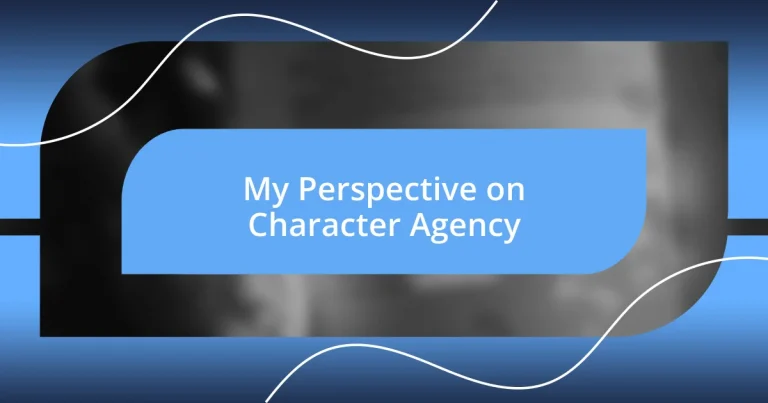Key takeaways:
- Character agency is essential for creating engaging narratives, as it allows characters to make impactful choices that resonate with audiences.
- Key components of character agency include motivation, conflict, consequences, character development, and relatability, all of which enrich the story.
- Developing character agency can be achieved by presenting significant choices, integrating personal backstories, and allowing for reflection and growth through failures.
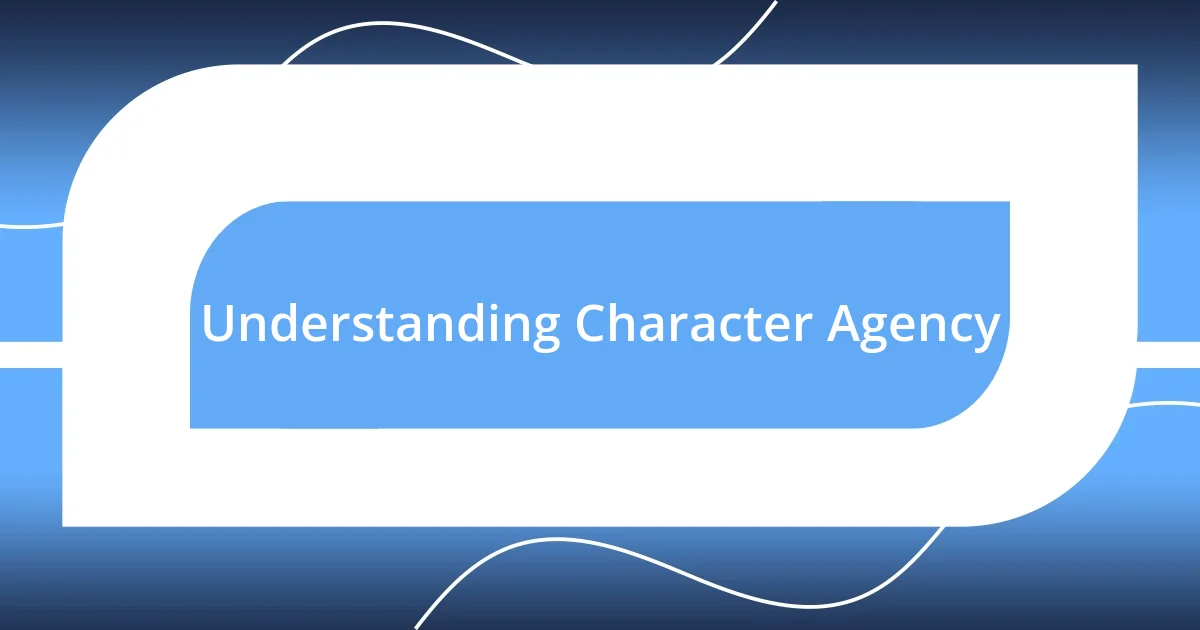
Understanding Character Agency
Character agency is all about giving your characters the power to make choices that affect their journey and outcomes. I remember when I witnessed a story where the protagonist’s decisions led to unexpected consequences. This made me realize how crucial it is for characters to have personal stakes in their actions—without this, these characters can come across as passive or unrelatable.
Think about your favorite books or movies. Have you ever felt truly invested in a character’s struggles and triumphs? That deep emotional connection usually stems from their ability to exert agency. When characters face dilemmas and make significant choices, it creates tension and drama that can pull us right into their world.
Conversely, a lack of agency can diminish a character’s impact. I’ve experienced this firsthand when following a story where characters seemed to stumble from one plot point to another without any real agency. It left me feeling detached and uninterested. Engaging narratives thrive on the dynamic tension created by characters who actively shape their destinies, inviting the reader along for the ride.
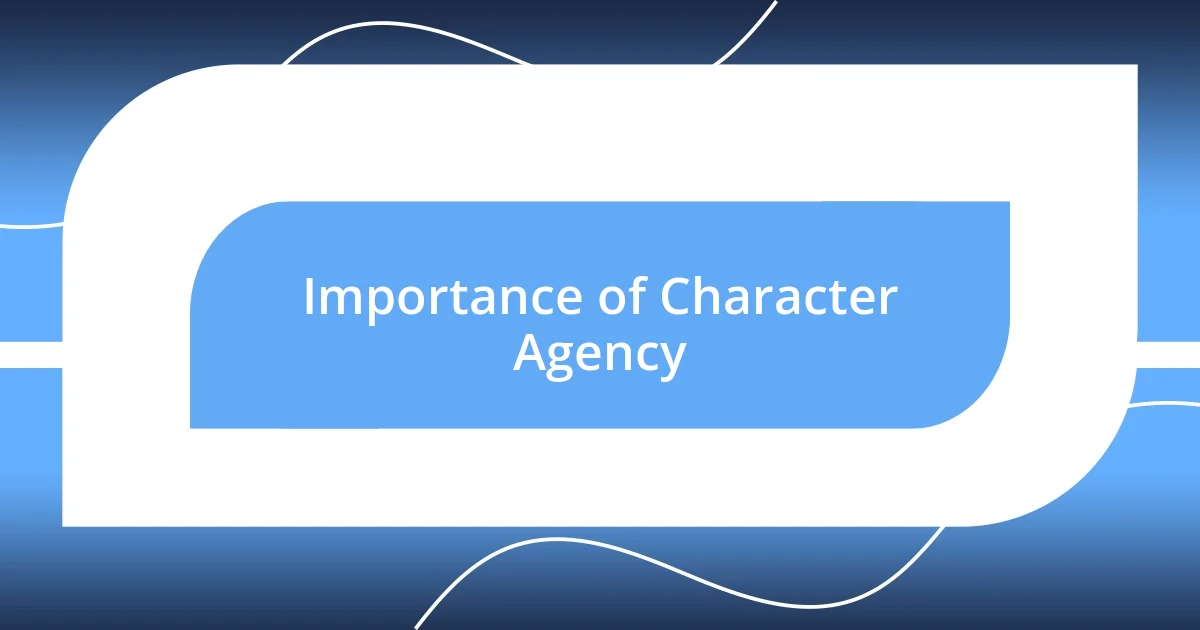
Importance of Character Agency
Characters with agency serve as the lifeblood of a narrative. I’ve often found myself more emotionally invested in stories where the characters actively drive the plot forward. When a character wrestles with difficult choices, their struggles resonate with me. It’s almost like sharing a conversation with a friend who is navigating life’s complexities. Being able to witness their growth through these challenges creates a powerful, immersive experience.
On the flip side, when characters lack agency, it can feel like I’m reading a script without any real connection. I remember feeling utterly disenchanted by a film in which the characters appeared to be mere pawns in a grand scheme, lacking the autonomy to influence their fate. Their fates felt predetermined, which left me disengaged and uninterested. This just reinforces how vital agency is; it adds layers to the narrative, makes characters relatable, and ensures that audiences can see themselves within those choices.
Ultimately, the importance of character agency cannot be overstated. It’s akin to being on a roller coaster—the twist and turns of a character’s choices make the ride thrilling. Each decision adds suspense and keeps me eager to turn the page or press play. Without character agency, narratives risk becoming flat and unmemorable, and trust me, that’s not the kind of ride anyone wants to take.
| With Character Agency | Without Character Agency |
|---|---|
| Emotional investment increases | Emotional disengagement |
| Active character participation | Passive story progression |
| Relatable growth | Flat narrative experience |
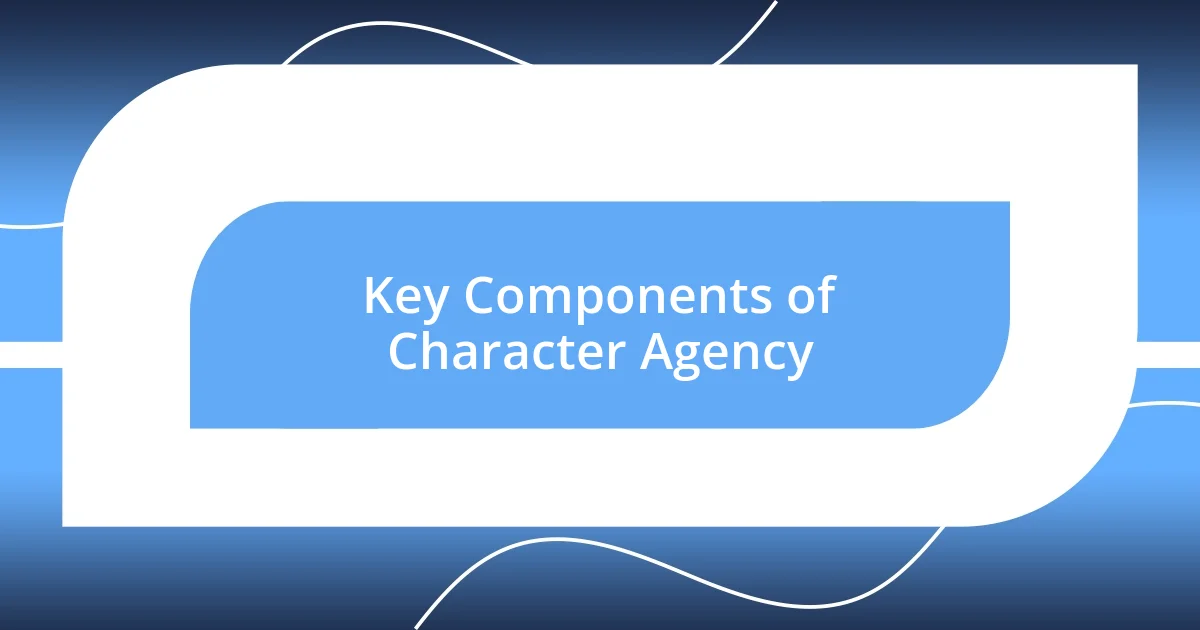
Key Components of Character Agency
Character agency is built on a few essential components that empower characters and enrich the narrative. A pivotal element is the character’s motivation. I recall an explosive scene in a novel where the protagonist’s drive to protect a loved one led to a series of bold choices that hinged on their emotional stakes. What really stood out to me was how that desire not only propelled the plot forward but also illuminated their true self. Characters need goals and emotions that resonate with the audience to feel authentic and relatable.
Another significant component is the freedom to make choices. When characters are presented with obstacles that require them to choose a path, the stakes are high and the tension palpable. Think of a suspenseful thriller where the main character is faced with a moral dilemma. I remember gripping my book, heart racing, as I questioned what I would do in their predicament. This sense of urgency drives engagement and creates a connection. Here are some key components to consider:
- Motivation: Characters should have clear desires, driving them to make choices.
- Conflict: Presenting obstacles helps in showcasing character strength and decision-making.
- Consequences: Characters need to experience outcomes from their choices, reinforcing their agency.
- Development: Growth arcs based on choices and their impact allow audiences to connect deeper.
- Relatability: Characters should reflect complexity, mirroring real-life dilemmas, enhancing emotional investment.
Each of these facets contributes to constructing a character that feels alive—one whose struggles and victories are genuinely felt by the audience.
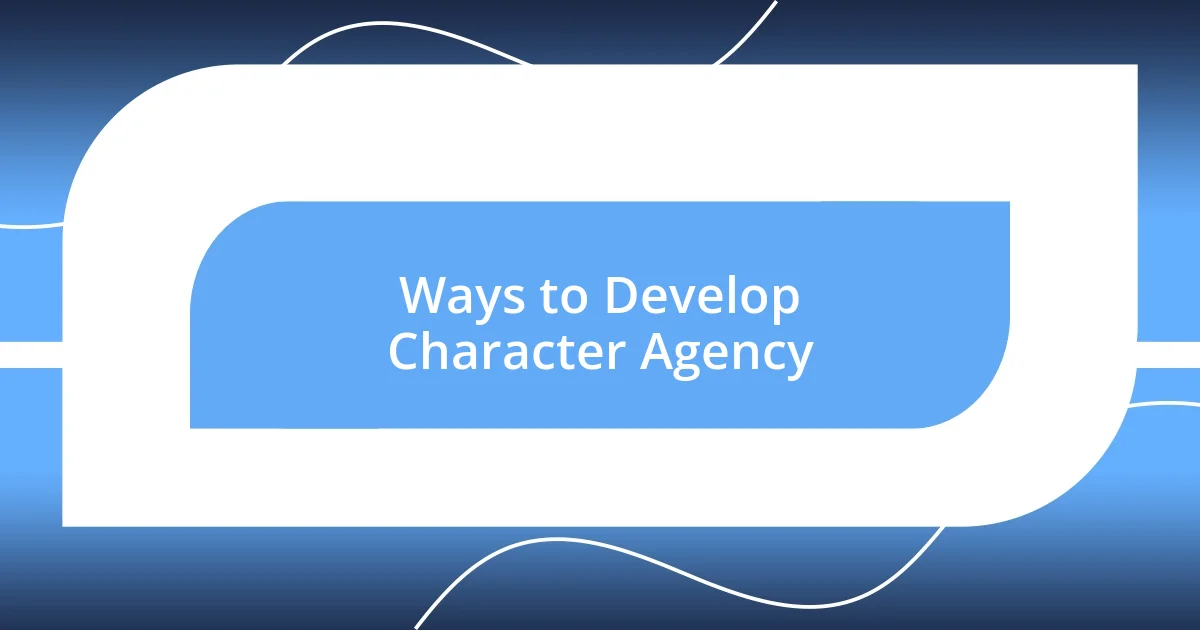
Ways to Develop Character Agency
To develop character agency, one of the most effective techniques I’ve encountered is allowing characters to face significant choices. I remember a story where the protagonist had to decide between loyalty to a friend and doing what was morally right. The tension in that moment was palpable; it made me reflect on my personal values. Presenting characters with tough decisions not only engages the audience, but it also adds depth to their personalities. How would you react in their situation?
Creating consequences for a character’s decisions is crucial as well. I once read a novel where a character’s choice led to unforeseen repercussions that escalated the plot and deepened my emotional investment. It was heart-wrenching to see how a single decision snowballed into a series of events. This element of cause and effect is like a ripple in a pond—each choice ripples out, affecting not just the character but the larger world around them. I find it intriguing how these interactions make the narrative feel like a living entity.
Lastly, weaving personal backstories into a character’s journey can amplify their agency significantly. I recall watching a film where the protagonist’s past shaped their actions dramatically. When a character’s history influences their choices, it invites the audience to empathize with their plight. I often find myself considering how my background informs my own decisions, and that connection makes the character’s struggles resonate even more deeply. How does understanding a character’s history affect your view of their agency in the story?
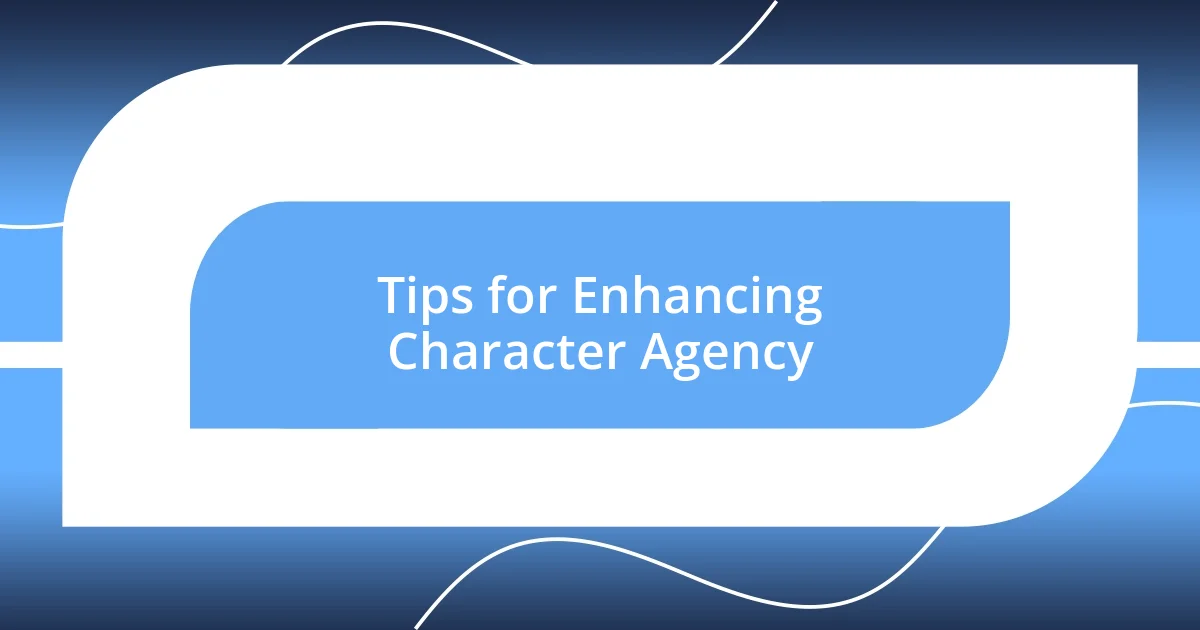
Tips for Enhancing Character Agency
One effective way to enhance character agency is by giving them room to fail and learn from their mistakes. I vividly remember a character in a series that boldly stepped into a challenge only to falter spectacularly. Watching them confront their failure was illuminating; I felt a wave of empathy wash over me, as I’ve certainly encountered similar situations in my own life. These moments not only build relatability but also allow characters to evolve, showing that growth often stems from our missteps.
Another technique is to create strong relationships between characters. In a romance novel I once read, the protagonist’s relationship with their partner acted as a catalyst for their decisions. The interplay between their aspirations and the emotional bonds they shared brought an intensity that made every choice feel weighty. I often wonder, how do the relationships in your own life shape your decisions? This adds another layer of complexity to the narrative, allowing readers to engage on a deeper level.
Lastly, consider including moments of reflection for your characters. I’ve noticed that when characters take time to ponder their choices, it gives them a greater sense of agency. In one captivating story, a thoughtful protagonist reflected on the paths available to them, wrestling with their thoughts until they reached a decisive conclusion. This introspection reminds me of my own experiences when I’ve had to weigh the pros and cons of my choices. Such reflective moments not only strengthen character development but can also drive the emotional stakes higher for readers.












